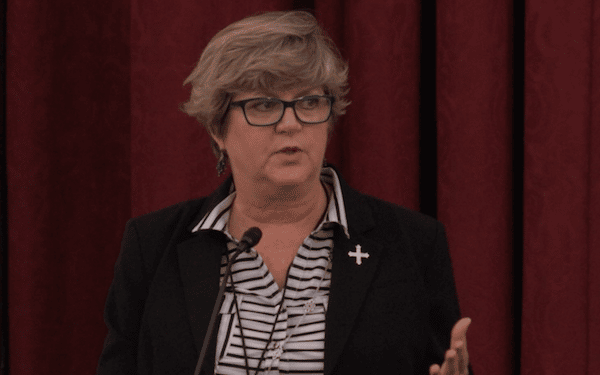The 2002 Enron scandal drew global attention and Sherron Watkins became forever known as the Enron whistleblower. Speaking at National Whistleblower Day earlier this year, she praised the crucial role whistleblowers play in demanding transparency and accountability from our corporations and government and recognized the incredible progress made in whistleblower protections since the collapse of Enron.
In 2001, Sherron Watkins was the vice president at Enron, a U.S. energy-trading and utilities company and one of America’s largest corporations. After reporting internally, the rampant fraud she discovered Enron was committing, Watkins was fired and her reputation tarnished.
At that time, corporate whistleblowers in the U.S. had no legal rights. Without fundamental legal protections such as confidential and anonymous reporting systems and monetary rewards, whistleblowers with the courage to speak out against wrongdoing were completely defenseless against employer retaliation.
“I went through what typical whistleblowers go through”, she recalled, “the isolation, the removal of your job responsibilities, the pariah treatment where friends just don’t want to be in the same room with you…”
Watkins continued, “There’s subtle ways to denigrate people, and there’s very direct ways to denigrate people. The isolation is just momentous when you’ve spoken truth to power.”
It was a complete shock to Watkins when she realized she needed legal help to defend herself, “I naively thought facts were going to rule out. And I gave a lot of facts to Kim Lay, Enron’s CEO, and I thought he would investigate. I never thought he was going to shoot the messenger… I didn’t even think I’d done anything wrong or needed a lawyer. I’m just delivering truth to power. You’ve got to have a lawyer.”
Watkins’ case led to the historic Sarbanes-Oxley Act, which provided some crucial anti-retaliation protections for employees of publicly traded companies who report violations of fraud against the shareholders. These protections were eventually expanded in 2010, resulting in the Dodd-Frank Wall Street Reform and Consumer Protection Act, through which the Securities Exchange Commission (SEC) provides whistleblower rewards of 10- 30% for original information of violations that lead to monetary sanctions of over $ 1million. Since the implementation of these safeguards, the detection of fraud has surged dramatically as whistleblowers are gradually empowered enough to speak out.
“You don’t blow the whistle because of monetary rewards,” said Watkins, “You don’t blow the whistle because of protections. You blow the whistle because you’re optimistic that the person you’re speaking truth to power to is going to listen and right the ship”.
The courage of Watkins and the thousands of other whistleblowers like her, pave the way for the continued progress of whistleblower rights. Through our collective support of whistleblowers, we show our elected officials the value we place on building a fair and transparent society that holds corrupt forces accountable.
Further Reading:
- Watch Sherron Watkins’ full speech at National Whistleblower Day 2017 below and watch more whistleblower stories.
- Help NWC fight for whistleblower rights by making a donation for #GivingTuesday.
- Know Your Rights. Order your copy of The New Whistleblower’s Handbook: A Step-by-Step Guide to Doing What’s Right and Protecting Yourself

